Illustrated Introduction to Keep Shining,
Cuba:
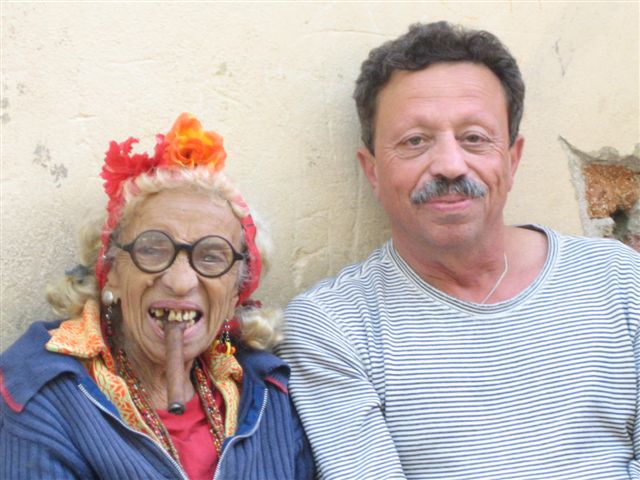
The Spirit of Old Havana
I gave this talk at a conference in delightful Havana.
After a long-time-no-see, the place looks much better, many houses and roads are
fixed; drugs and prostitutes are not visible, there are newer cars, but the old
charm remains.
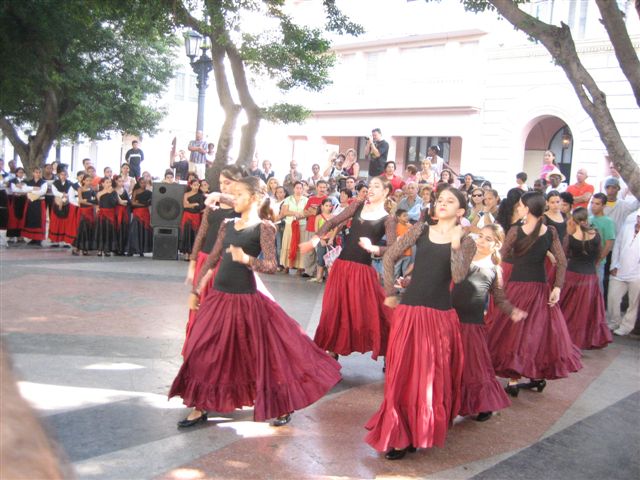
Street Dancers
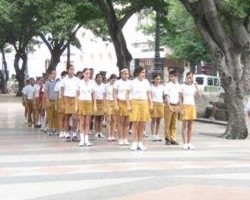 The colonial Old Havana is being turned – thanks to
UNESCO help – into one of the most exciting places in the Western hemisphere. 17th
century palaces are alive again, converted into hotels, museums, restaurants,
practically all state-owned. Plenty of cafés, where tourists and locals can mix,
are pleasant of design, but food varies from awful to indifferent. Drinks are as
good as in the days of Hemingway.
The colonial Old Havana is being turned – thanks to
UNESCO help – into one of the most exciting places in the Western hemisphere. 17th
century palaces are alive again, converted into hotels, museums, restaurants,
practically all state-owned. Plenty of cafés, where tourists and locals can mix,
are pleasant of design, but food varies from awful to indifferent. Drinks are as
good as in the days of Hemingway.
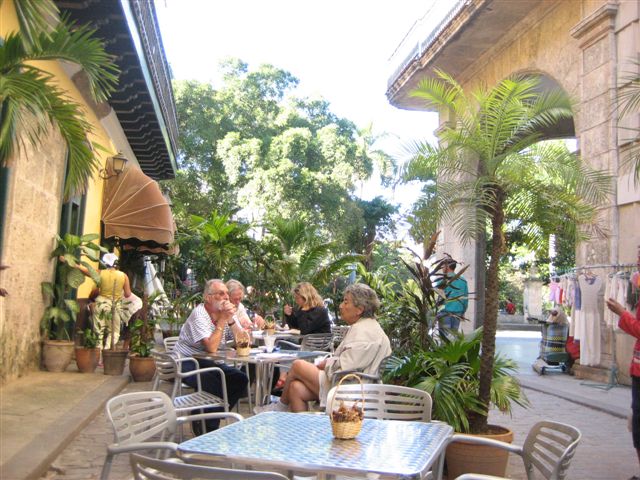
A Cozy nook in Old Havana
Even in dilapidated areas one finds none of the despair,
violence and despondency one meets in, say, the South Bronx. People are
a-singing, a-dancing and a-smoking their long cigars wherever they wish – that’s
freedom!
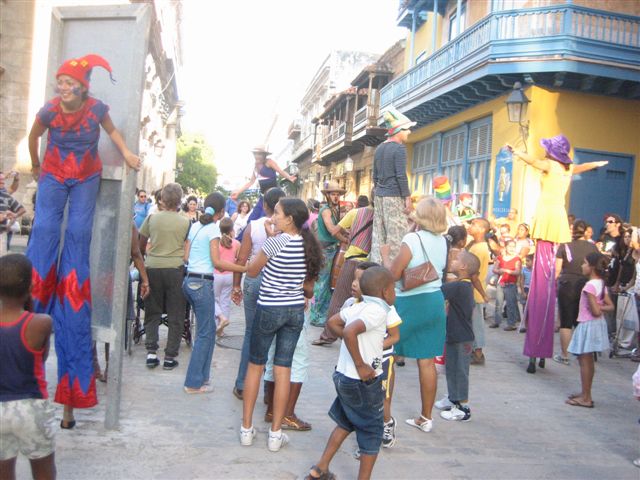
Street Festival
He who provides even for a bird provides for Cubans too:
shops are short of goods, but people appear well-fed and well-dressed. The
Cubans have no mortgage to pay, they do not work too hard, and have a plenty of
free time for their leisure activities.
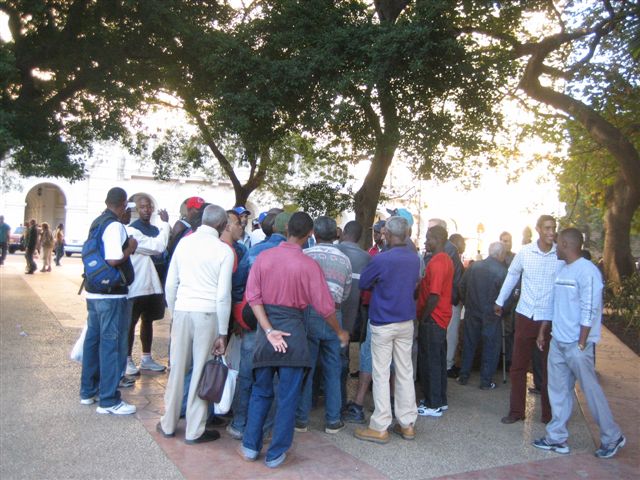
They have turned their Central Park into a Hyde Park Corner
They have turned their Central Park into a Hyde Park Corner,
though the discussion is mainly about sports.
Cubans travel abroad too, though it isn’t easy for them to
get entry visas to the same countries that never cease to complain
about Cuba’s restrictive immigration policies. My acquaintance went to Miami
three times to visit her family, but the forth time she was refused a US visa.
Many Cubans travel to Latin American countries to fight illiteracy or provide
medical help, - and they come back home. There is little anxiety and much hope
for a better future, however, a future without drastic changes. Cuban painters,
artists and musicians are doing well, and they produce some very original stuff.
Churches are being restored after long neglect, though
attendance is still quite low. Many people still feel that it is either the
church or socialism. The Vatican is quite negative towards the revolution and to
socialism; the church does not want to leave its seclusion, a sober-minded
priest told me. Meanwhile, Santeria, a native cult of African origin, is
spreading widely. One often sees people wearing all-white; they are adepts of
Santeria. The state does not bother with the Catholic Church, or with Santeria,
either.
In the countryside, things are not bad either. The country is
green and clean; especially farther away from Havana’s suburbs.
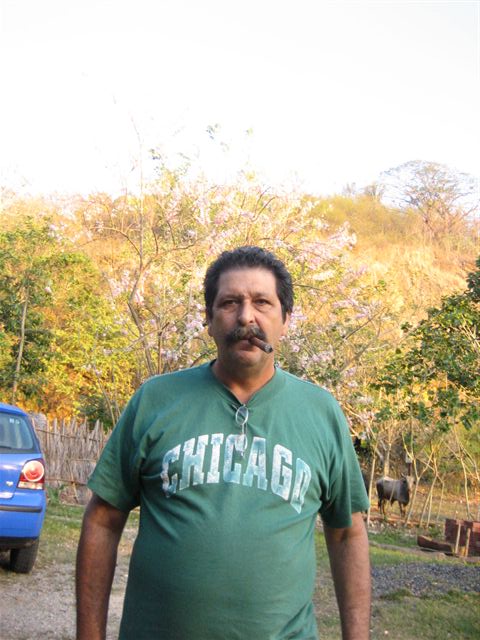
Coffee Farmer Israel
I stayed with a coffee farmer in the mountains some 100 km to
the west of Havana. Improbably, his name was Israel, too, not a rare name here
-- a huge guy, doing everything on his 5 hectares of land with his own hands and
with two hired hands -- he was quite content with socialism: the state always
buys his product and pays him decent money: buying for 20 what it sells for 25
in the shops.
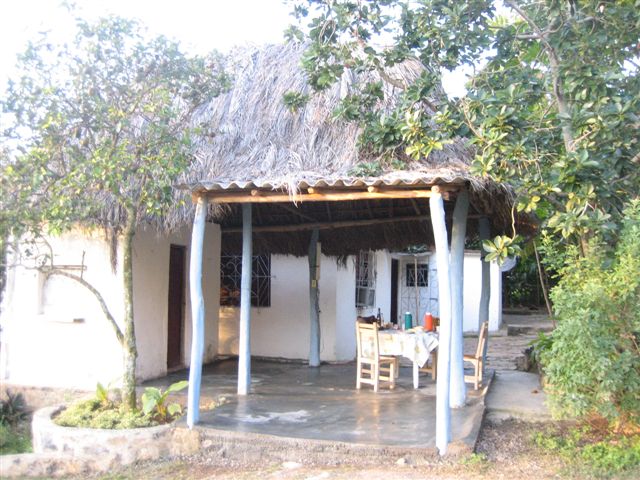
Farmer's House
His daughter became a doctor, while his son helps on the
farm. Their only worry is that the state pays them in local currency, while for
many of his purchases he must pay in hard, convertible pesos.
Surely unpleasant, but it is not a simple question. Nowadays,
many people discover advantages of having a local currency. Read on
http://www.berkshares.org/ about an experiment in BerkShares, a local
currency designed for use in the Southern Berkshire region of Massachusetts.
“The purpose of a local currency is to function on a local scale the same way
that national currencies have functioned on a national scale—building the local
economy by maximizing circulation of trade within a defined region.” For an
independent country, it is difficult to avoid a run on a currency if it is open
to trading. You probably remember how George Soros halved the UK pound or the
Malay Rupee; Cuba would be devastated by traders in a minute.
Our friend Israel earns hard currency by renting rooms to
foreigners who come to bask in the waters of Soroa, a place of delight and
seclusion in a hidden mountain valley.
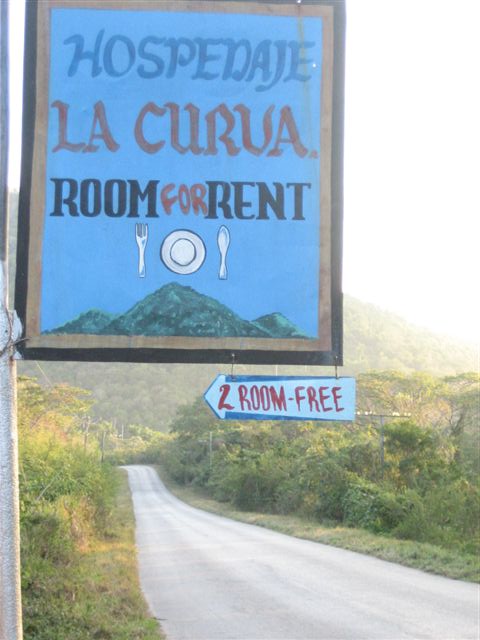
Israel's hospitable place in Soroa
You are welcome to stay here: there is no phone, but he will
accommodate you well enough and the price is usual, while the dinner was the
best I had on the Island.
The country is in rather good shape, though quite expensive
for a visitor. They have a punitive rate of exchange for the US dollar, so bring
some other currency with you. However, posters of “George Bush equals Adolf
Hitler” and black flags in front of the US embassy more than make up for such
small inconveniences. Fidel still rules personally, and the newspaper publishes
his letters in his own handwriting. Yes, all that is strange, but Cuba is trying
to defeat Greed, and that is a mighty hard job. Greed and Lust are the hardest
to beat, the Talmud tells us, as if we did not already knowJ.
The Russians never recovered the positions they lost in Cuba.
Fidel does not forgive them the Gorbachev days, when the [anti-]Soviet KGB
surrendered one socialist state after another to the Americans. Cuba was
scheduled somewhere between the German Democratic Republic and Romania. The GDR
was a very successful state, and the Ossies still regret its demise. But the KGB
was bent on the total elimination of socialism. The Romanian president was shot
for being stubborn. In Cuba, Gorbachev’s forces primed General Ochoa for coup-d’etat,
and full restoration of US rule, but Fidel learned of it and had the traitor
executed, the Russian
left.ru reported recently.
Putin also began with surrender – that of the Russian
monitoring base in Cuba. This was closed, ostensibly because the annual rent
(for listening in on all North American traffic) was too high. True, Putin and
Russia have changed a lot since 2000, but they will have to work hard to cover
for the faults of years gone by. The monitoring base became a big international
university.
Venezuela is the current big friend of Cuba. The two have
manifold relations, not only trade. Many Venezuelans, as well as important Cuban
and Latin American personalities, revolutionaries and dignitaries attended the
conference; Spanish was de rigueur, and I was saved by
campanera Prof Maria Poumier, our
friend, colleague, writer and translator with vast connections in Cuban society.
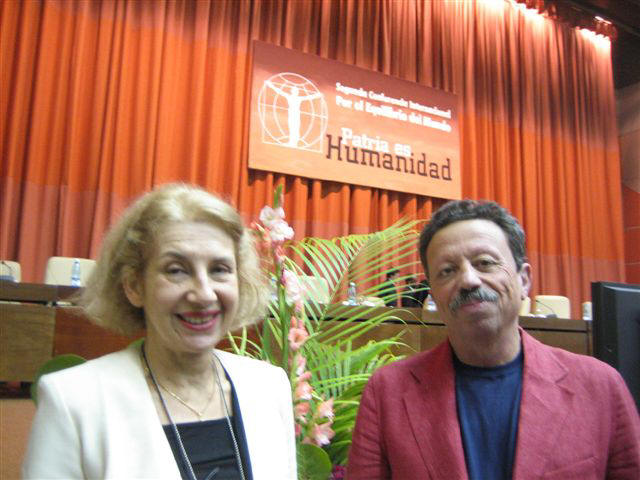
Shamir with Maria Poumier
Like so many Cubans, she prefers Martian to Marxian. Now, she
is not keen on warfare, and she did not turn into a little green manJ
Jose Marti, a 19th c. Cuban writer has displaced Karl Marx in public
conscience. Not a bad idea: down with the cult of these important German
thinkers! Marx, Freud or Einstein, no! Cuba Libre, si! Or rather mojito,
please.
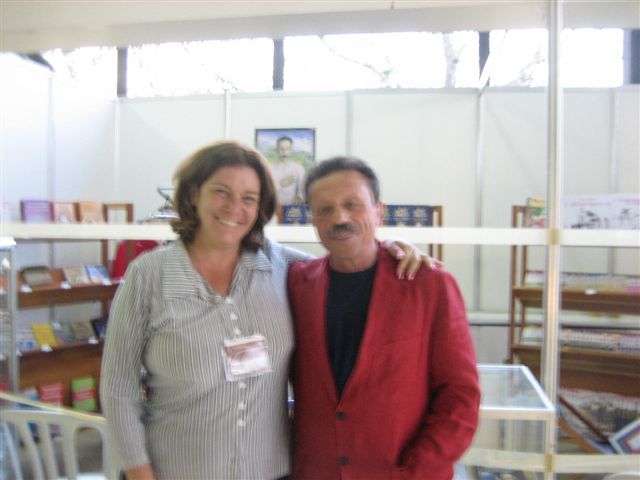
Among the interesting people I met there was
Celia Hart with whom I argued about Stalin (my preference) and Trotsky
(hers) some years ago, and we made peace over Ronkoli (Rum Collins, in Cuban).
Another Cuban I argued with, Otero, died shortly afterwards, so we had no time
for reconciliation.
I appeared on Cuban national TV and gave interviews to both
national newspapers, promoting our idea of one democratic state instead of
Jewish-run apartheid in Palestine/Israel. South African apartheid was destroyed
by Cuban bravery in Angola, I felicitated them. And they replied curtly: we are
not planning to send troops to liberate Gaza.

